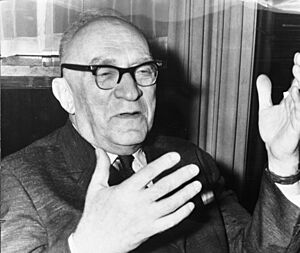Evsei Liberman facts for kids
Evsei Grigorievich Liberman (born October 2, 1897 – died November 11, 1981) was an important economist from the Soviet Union. He lived in Kharkiv, which is now in Ukraine. Liberman is best known for creating a big plan to change the Soviet economy in 1965. This plan was even called "Libermanism" after him.
Contents
About Evsei Liberman
Evsei Liberman was born in Slavuta, which was part of the Russian Empire at the time. His family was wealthy. He studied law at Kiev University and later engineering and economics in Kharkiv.
He taught at several universities in Kharkiv, including the Kharkiv National University of Economics.
His Big Idea for the Economy
Liberman came up with new ways to plan the economy. He believed that factories and businesses should have more freedom to make decisions. He thought this would help them work better and make more profit. This idea was part of something called "new democratic centralism".
His ideas were published in a famous newspaper called Pravda in 1962. This article was titled "Plan, benefit and prisms." These ideas became the foundation for the Soviet economic reforms that happened in 1965.
What Happened with His Reforms?
The changes inspired by Liberman tried to make the Soviet economy stronger in the 1960s. However, these reforms were not as successful as hoped. Some of Liberman's ideas were also used in East Germany.
His Family
Evsei Liberman's wife was Regina Horowitz. She was a talented pianist and a teacher. Her brother was the very famous pianist Vladimir Horowitz. Liberman's great-granddaughter, Génia, is also a skilled concert pianist today. Evsei Liberman passed away in 1981 in Kharkiv.
See also
- Kharkiv National University of Economics
- In Spanish: Ovsiy Hrihorovich Liberman para niños


